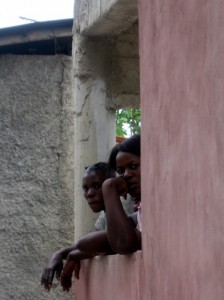A few weeks ago, there was an article in the Des Moines Register about gold having been discovered in the heart of the northern highlands of Haiti. It was optimistically reported that the vast mineral reserves, worth an estimated $20 billion, have the potential of being salvation for the poorest country in the Western Hemisphere. Further examination, however, leads one to wonder. It could indeed be a “golden” opportunity for the nation as a whole. Job creation, money for public works, government investment in education – all of that and more is possible. The other side of the golden coin is that the only ones who might really come out ahead are the foreign investors and a few influential Haitians seeking to line their own pockets by granting lucrative permits for exploration and mineral extraction.
![sm355[1]](https://blog.itscactus.com/wp-content/uploads/2012/06/sm35513.jpg)
So which is it?
According to Jane Regan, lead author of a recent report by Haiti Grassroots Watch, there is a perfect storm brewing. “Giant pit mines are being dug by Canadian and American companies in a country that is already environmentally devastated. Most of the money and gold dug up will go out of Haiti, straight north.” She might have something there. In the report, there were interviews of farmers in the Dominican Republic, at the other end of the mineral veins.
They complained of being displaced from their farms by these same North American companies, and left with no means of providing for themselves. Because mining is such a highly mechanized process, very few jobs were created for the local Dominican populace. Skilled labor, it turned out, was imported.
On the other hand, World Bank’s Sustainable Development Vice President Rachel Kyte takes a much different view. “When public and private sectors work in partnership, gold mining can have real and positive benefits for the communities around the mining sites and for the mining countries in general. It is possible to make concrete progress when and wherever there is the political will and a robust regulatory framework to ensure that the revenues are well-managed and invested in sustainable development.” Thus, it seems a beneficial outcome in Haiti is possible if the Haitian government steps up to protect its own.
government steps up to protect its own.
Apparently there are a few heavy hitters in government ready to rise to the occasion. As reported on hindu.com, Prime Minister Laurent Lamothe said, “The most important thing is to have the correct mining law. It ensures that the right portion comes to the state. It ensures that the people living in the region where the mines are, that their rights are protected. It ensures environmental protection.” Deiuseul Anglade concurs. In a Huffington Post article dated May 11th, the Bureau of Mines Director is quoted as saying, “If the mining companies are honest and if Haiti has a good government, then here is a way for this country to move forward. The gold in the mountains belong to the people of Haiti. And they need it”
Yes it does, and yes they do. Actions, however, speak louder than words. Enough said.
